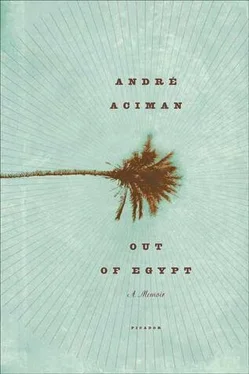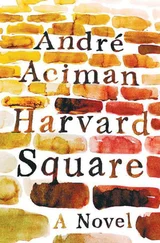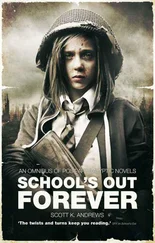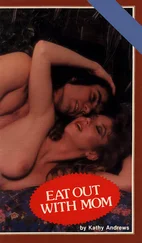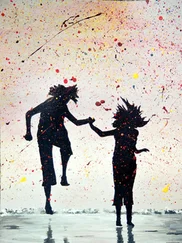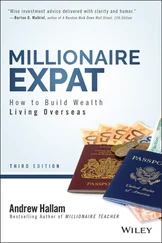After a second round of mango ice cream, she said, “And now we’ll buy you a good book and then we might stop a while at the museum.” By “good book” she meant either difficult to come by or one she approved of. It was to be my fourteenth-birthday present. We left the restaurant and were about to hail another carriage when my grandmother told me to make a quick left turn. “We’ll pretend we’re going to eat a pastry at Flückiger’s.” I didn’t realize why we were pretending until much later in the day when I heard my father yell at my grandmother. “We could all go to jail for what you did, thinking you’re so clever!” Indeed, she had succeeded in losing the man who had been tailing us after — and probably before — we entered Athinéos. I knew nothing about it when we were inside the secondhand bookstore. On one of the stacks I had found exactly what I wanted. “Are you sure you’re going to read all this?” she asked.
She paid for the books absentmindedly and did not return the salesman’s greeting. She had suddenly realized that a second agent might have been following us all along. “Let’s leave now,” she said, trying to be polite. “Why?” “Because.” We hopped in a taxi and told the driver to take us to Ramleh station. On our way we passed a series of familiar shops and restaurants, a stretch of saplings leaning against a sunny wall, and, beyond the buildings, an angular view of the afternoon sea.
As soon as we arrived at Sporting, I told my grandmother I was going straight to the Corniche. “No, you’re coming home with me.” I was about to argue. “Do as I tell you, please. There could be trouble.” Standing on the platform was our familiar tail. As soon as I heard the word trouble, I must have frozen on the spot, because she immediately added, “Now don’t go about looking so frightened!”
My grandmother, it turned out, had been smuggling money out of the country for years and had done so on that very day. I will never know whether her contact was Sidi Daoud, or the owner of the secondhand bookstore, or maybe one of the many coachmen we hired that day. When I asked her in Paris many years later, all she volunteered was, “One needed nerves of steel.”
Despite the frantic packing and last-minute sale of all the furniture, my mother, my grandmother, and Aunt Elsa had decided we should hold a Passover seder on the eve of our departure. For this occasion, two giant candelabra would be brought in from the living room, and it was decided that the old sculptured candles should be used as well. No point in giving them away. Aunt Elsa wanted to clean house, to remove all traces of bread, as Jews traditionally do in preparation for Passover. But with the suitcases all over the place and everything upside down, nobody was eager to undertake such a task, and the idea was abandoned. “Then why have a seder?” she asked with embittered sarcasm. “Be glad we’re having one at all,” replied my father. I watched her fume. “If that’s going to be your attitude, let’s not have one, see if I care.” “Now don’t get all worked up over a silly seder, Elsa. Please!”
My mother and my grandmother began pleading with him, and for a good portion of the afternoon, busy embassies shuttled back and forth between Aunt Elsa’s room and my father’s study. Finally, he said he had to go out but would be back for dinner. That was his way of conceding. Abdou, who knew exactly what to prepare for the seder, needed no further inducements and immediately began boiling the eggs and preparing the cheese-and-potato buñuelos.
Meanwhile, Aunt Elsa began imploring me to help read the Haggadah that evening. Each time I refused, she would remind me that it was the last time this dining room would ever see a seder and that I should read in memory of Uncle Nessim. “His seat will stay empty unless somebody reads.” Again I refused. “Are you ashamed of being Jewish? Is that it? What kind of Jews are we, then?” she kept asking. “The kind who don’t celebrate leaving Egypt when it’s the last thing they want to do,” I said. “But that’s so childish. We’ve never not had a seder. Your mother will be crushed. Is that what you want?” “What I want is to have no part of it. I don’t want to cross the Red Sea. And I don’t want to be in Jerusalem next year. As far as I’m concerned, all of this is just worship of repetition and nothing more.” And I stormed out of the room, extremely pleased with my bon mot . “But it’s our last evening in Egypt,” she said, as though that would change my mind.
For all my resistance, however, I decided to wear one of my new ties, a blazer, and a newly made pair of pointed black shoes. My mother, who joined me in the living room around half past seven, was wearing a dark-blue dress and her favorite jewelry. In the next room, I could hear the two sisters putting the final touches to the table, stowing away the unused silverware, which Abdou had just polished. Then my grandmother came in, making a face that meant Aunt Elsa was truly impossible. “It’s always what she wants, never what others want.” She sat down, inspected her skirt absentmindedly, spreading its pleats, then began searching through the bowl of peanuts until she found a roasted almond. We looked outside and in the window caught our own reflections. Three more characters, I thought, and we’ll be ready for Pirandello.
Aunt Elsa walked in, dressed in purple lace that dated back at least three generations. She seemed to notice that I had decided to wear a tie. “Much better than those trousers with the snaps on them,” she said, throwing her sister a significant glance. We decided to have vermouth, and Aunt Elsa said she would smoke. My mother also smoked. Then, gradually, as always happened during such gatherings, the sisters began to reminisce. Aunt Elsa told us about the little icon shop she had kept in Lourdes before the Second World War. She had sold such large quantities of religious objects to Christian pilgrims that no one would have guessed she was Jewish. But then, at Passover, not knowing where to buy unleavened bread, she had gone to a local baker and inquired about the various qualities of flour he used in his shop, claiming her husband had a terrible ulcer and needed special bread. The man said he did not understand what she wanted, and Elsa, distraught, continued to ask about a very light type of bread, maybe even unleavened bread, if such a thing existed. The man replied that surely there was an epidemic spreading around Lourdes, for many were suffering from similar gastric disorders and had been coming to his shop for the past few days asking the same question. “Many?” she asked. “Many, many,” he replied, smiling, then whispered, “ Bonne pâque, happy Passover,” and sold her the unleavened bread.
“ Se non è vero, è ben trovato, if it isn’t true, you’ve made it up well,” said my father, who had just walked in. “So, are we all ready?” “Yes, we were waiting for you,” said my mother, “did you want some scotch?” “No, already had some.”
Then, as we made toward the dining room, I saw that my father’s right cheek was covered with pink, livid streaks, like nail scratches. My grandmother immediately pinched her cheek when she saw his face but said nothing. My mother too cast stealthy glances in his direction but was silent.
“So what exactly is it you want us to do now?” he asked Aunt Elsa, mildly scoffing at the ceremonial air she adopted on these occasions.
“I want you to read,” she said, indicating Uncle Nessim’s seat. My mother stood up and showed him where to start, pained and shaking her head silently the more she looked at his face. He began to recite in French, without irony, without flourishes, even meekly. But as soon as he began to feel comfortable with the text, he started to fumble, reading the instructions out loud, then correcting himself, or skipping lines unintentionally only to find himself reading the same line twice. At one point, wishing to facilitate his task, my grandmother said, “Skip that portion.” He read some more and she interrupted again. “Skip that too.”
Читать дальше
